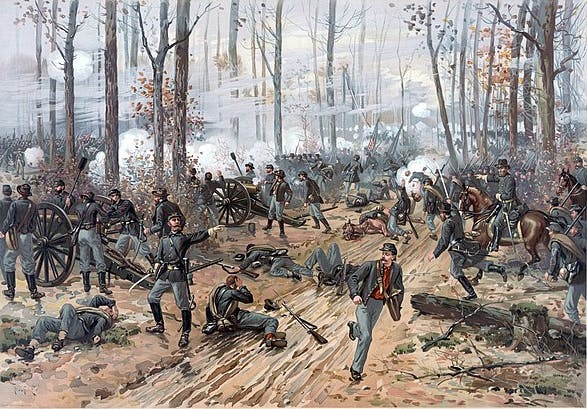Poem of the Day: Phil Klay selects ‘Shiloh’
All is hushed at Shiloh, perhaps, but we’re set off balance, and less soothed by the standard elegiac approaches to war dead.

For the fourth day of a week of war poetry in The New York Sun, guest editor Phil Klay writes:
“Shiloh: A Requiem (April 1862)” by Herman Melville (1819–1891) is almost a bad poem (or a mediocre one). We have the tranquil natural imagery of the swallows, the forest-field of Shiloh, and even the “log-built” church which echoes a “natural prayer” to the dying soldiers, undistinguished by cause or side in the Civil War.
This sits rather comfortably with the old notions of the tragedy of war. Yet there, in the middle is that odd, forceful parenthetical, “(What like a bullet can undeceive!)” The mood established by the preceding lines pops, even at the level of sound (“undeceive” fights, and emerges victorious, against the tone set by every other word in the poem).
We leave the poem unsettled. All is hushed at Shiloh, perhaps, but we are set off balance, less soothed by the standard elegiac approaches to war dead.
Shiloh: A Requiem (April, 1862)
by Herman Melville
Skimming lightly, wheeling still,
The swallows fly low
Over the field in clouded days,
The forest-field of Shiloh —
Over the field where April rain
Solaced the parched ones stretched in pain
Through the pause of night
That followed the Sunday fight
Around the church of Shiloh —
The church so lone, the log-built one,
That echoed to many a parting groan
And natural prayer
Of dying foemen mingled there —
Foemen at morn, but friends at eve —
Fame or country least their care:
(What like a bullet can undeceive!)
But now they lie low,
While over them the swallows skim,
And all is hushed at Shiloh.
___________________________________________
With “Poem of the Day,” The New York Sun offers a daily portion of verse selected by Joseph Bottum with the help of the North Carolina poet Sally Thomas, the Sun’s associate poetry editor. Tied to the day, or the season, or just individual taste, the poems will be typically drawn from the lesser-known portion of the history of English verse. In the coming months we will be reaching out to contemporary poets for examples of current, primarily formalist work, to show that poetry can still serve as a delight to the ear, an instruction to the mind, and a tonic for the soul.
